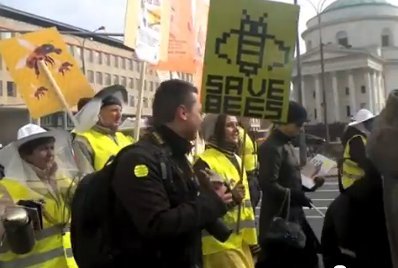Apoyar la lucha contra Belo Monte, una lucha que aún no ha terminado

CGI rendition of the main dam, Belo Monte

Para contribuir, haga clic en http://www.vakinha.com.br/VaquinhaP.aspx?e=140562
Etiquetas: Belo Monte, Brasil, esp
Blogueando desde marzo de 2004 / Blogging since March 2004. Creador también de The World According to Carmelo: carmeloruiz.tumblr.com. Contacto: ruiz@tutanota.com. Twitter: @carmeloruiz


Etiquetas: Belo Monte, Brasil, esp
Etiquetas: Consortium News, eng, Obama, Ray McGovern

Etiquetas: eng, Guatemala, Podcast, This American Life

You can read more pieces from The Progressive Media Project by clicking here.
Etiquetas: Carmelo, eng, The Progressive
(1) Propuesta de Reglamento sobre Bioseguridad para Organismos Genéticamente Modificados en el sector agropecuario. Albán M.A y Torres M.L. Informe final de consultoría no publicado. PSA/MAG/BID. Convenio MAG/IICA. Quito, mayo de 2000.
(2) Biotechnology Ecuador Standing Biotechnology Report 2005, USDA Foreign Agricultural Service, GAIN Report Number: EC5008
(3) El 15 del 2004 en la oficina de The Nature Conservancy, TNC, en Quito, se llevó a cabo una reunión con los socios locales de esta organización, USAID y un representante de la embajada de Estados Unidos para plantear una estrategia de cabildeo a alto nivel con el fin de presionar a los miembros del Congreso Nacional para la aprobación en segundo debate de la Ley de Biodiversidad.
(4) Bravo A, 2007 Impactos de la introducción de alimentos transgénicos a través de los programas de ayuda alimentaria en Ecuador y Guatemala, CLACSO, Argentina.
(5) Ver aquí.
(6) El Expreso, 21 de Julio de 2010.
(7) (10QUITO54) Embassy Quito Request for Funding of Biotech Proposal. Ver aquí.

 Apicultores polacos logran un triunfo contra Monsanto, que está exterminando las abejas con sus cuestionados cultivos transgénicos |

 Our
‘Drop the Money Bomb on Monsanto’ campaign continues to make history,
as more individuals and more groups pitch in to help guarantee a $1
million matching gift – and the nation’s first victory in GMO labeling.
Our
‘Drop the Money Bomb on Monsanto’ campaign continues to make history,
as more individuals and more groups pitch in to help guarantee a $1
million matching gift – and the nation’s first victory in GMO labeling. In
an effort to expose Monsanto's greed and hold the company accountable
for their crimes, we are making Genetic Crimes Unit (GCU) Action Kits
available for free to the first 50 groups who commit to Occupy Monsanto
during the week of September 17th, 2012. Fill out the online form with
your mailing address, email address, size, and basic info (date, time,
and location) about your Occupy Monsanto plans for the week of September
17th and get your free kit!
In
an effort to expose Monsanto's greed and hold the company accountable
for their crimes, we are making Genetic Crimes Unit (GCU) Action Kits
available for free to the first 50 groups who commit to Occupy Monsanto
during the week of September 17th, 2012. Fill out the online form with
your mailing address, email address, size, and basic info (date, time,
and location) about your Occupy Monsanto plans for the week of September
17th and get your free kit! Etiquetas: Biotech, eng, Monsanto, Organic Consumers Association
 Photo by Frank Busacca (Getty)
Photo by Frank Busacca (Getty)
Etiquetas: eng, Podcast, The Dinner Party


Etiquetas: esp, Especulacion, RALLT
Etiquetas: Africa, eng, Food First


Etiquetas: eng, NPR, This American Life

